When it comes to the climate change debate, one of the most overlooked topics within it is food waste. This is a massive oversight considering food waste is one of the main contributors to global greenhouse gases and that addressing it at home is the single most powerful thing an individual can do to take climate action.
A recent study found that globally, a whopping 1 in 3 of all food is wasted and that 8-10% of global greenhouse gas emissions are caused by wasted food. In Australia, we waste 7.6 million tonnes of food each year, costing the economy over $36.6 billion. And in our homes alone, we waste 2.5 million tonnes, with 312kg wasted per person.
So, what can we do about this? Because while we know we should simply try to stop buying food we know will likely go to waste, it’s easier said than done. Again, 312kg of wasted food per person a year is a lot of food we’re looking to reallocate.

To help us understand what we can do to lower our household food waste, OzHarvest teamed up with BehaviourWorks Australia to conduct pioneering research which identified the consumer behaviours that mattered most.
The research identified a list of household food waste behaviours and then ordered them into a matrix based on their impact, current levels of adoption and likelihood for uptake. The high impact, high likelihood box — behaviours that will make a significant difference to your food waste and are easy to adopt — identified the following (with the first two particularly beneficial):
- Once a week, make a meal with food that needs using up.
- Before cooking a meal, check how many household members will be eating.
- Have a ‘use it up’ shelf in the fridge and/or pantry for any food that needs to be eaten.
- Freeze excess food.
- Check stock before shopping.
- Store leftovers correctly.
- Plan for using close-to-date food.
- Once a week, cook a meal from food in the freezer.
- Buy frozen vegetables.
The research also looked into the key influencing factors on these behaviours, identifying two in particular. It found that the attitudes of household members towards the behaviour played a role — that a positive attitude increased the likelihood of uptake — and that perceived control over the behaviour was also important.
In other words, the most appropriate skills and knowledge someone has, the more likely they will engage in the behaviour, meaning that by reading this article, you’re already one step ahead of the game. Now, share it with all your friends and family and let’s do our part for climate action.
To find out more about OzHarvest’s Halving Food Waste Report, visit their website.
Read more stories from The Latch and subscribe to our email newsletter.







